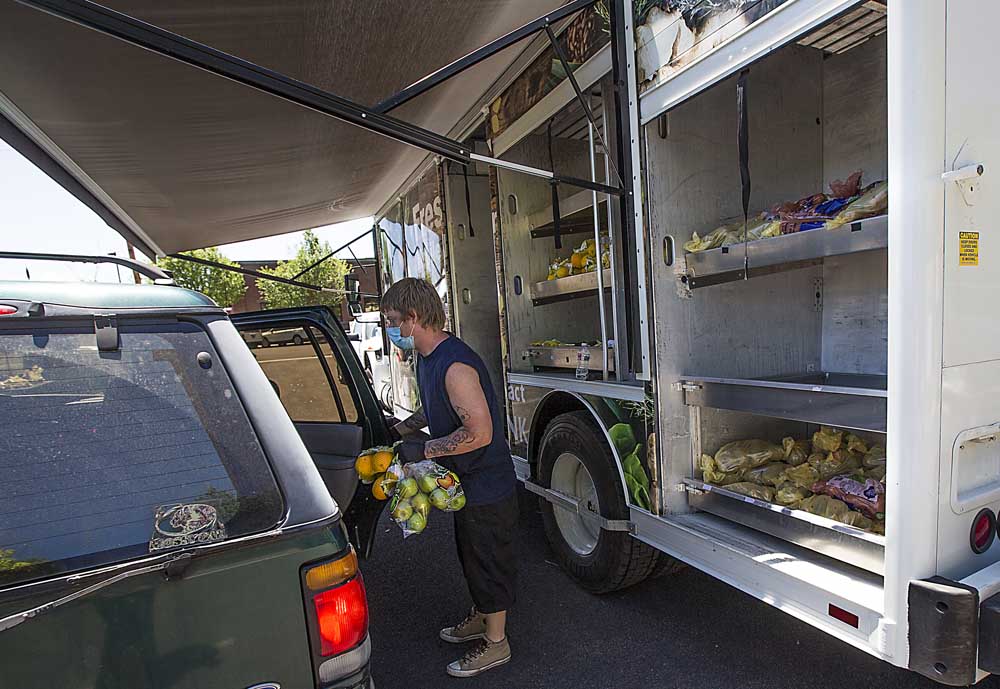Oregon State athletics facing severe 2020-21 budget cuts without a complete football schedule, at least 50 percent Reser Stadium capacity
Published 9:45 pm Monday, June 1, 2020

- Oregon State University athletic director Scott Barnes, right.
Among the myriad items on the computer desktop of Oregon State athletic director Scott Barnes are Reser Stadium attendance models for the 2020 football season.
The coronavirus outbreak-impacted models for the seven-game home season range from no fans to every seat for sale, from an on-time start to the season to pushing games into December and 2021.
Barnes says he’s focused on a 45,000-seat stadium with 50 percent capacity and the possibility of playing games later in the year. The latter could give Oregon State a chance to sell tickets beyond a half-full Reser Stadium.
Anything less than 50 percent capacity may cause significant cuts to Oregon State’s 2020-21 athletic budget. Even at 50 percent, the outlook isn’t ideal.
The original budget for the upcoming year, kicking in July 1, was about $84 million. While the budget will be finalized sometime during the next 30 days, Barnes cautions that it could change again in the fall. It depends on football, which generates about 75 percent of the department’s revenue.
Barnes says they’re expecting a revenue reduction of “anywhere from $8 million and up,” depending on how many football games are played and tickets they can sell.
“At Oregon State that number, if it is $8 (million) or 10 or 12, is more significant, more dramatic for us because we have a smaller budget than most,” Barnes said. “The measures we take to mitigate those issues are going to be deeper and more severe.”
Barnes said any staff reductions and salary cuts for the upcoming budget will take place by July 1.
The ability to sell football tickets could mitigate some damage because Barnes says “the appetite is there.” All but 6% of some 14,000 season tickets from last year have been renewed, a rate Barnes says OSU hasn’t experienced in seven years.
If Oregon State is allowed to play its home games at 50 percent of Reser Stadium’s capacity, Barnes said the school “would hope” to accommodate all season ticket holders and students. The likelihood of single-game ticket sales at 50 percent capacity depends on how many students commit to attending games.
It’s yet to be determined where fans will ultimately sit, including suite holders.
Barnes said it hasn’t been worked out as to who gets into games if the stadium is restricted to 25 percent capacity or less. He said OSU is likely to use the season ticket priority system as a baseline.
If some season tickets holders are unable to use their tickets due to restricted stadium capacity, Barnes said they’ll receive a credit for future seasons. There will not be refunds.
Regardless of how many fans are allowed to attend home games, Barnes said students will be in the mix.
Barnes said Oregon State is holding off selling single-game tickets until stadium restrictions are determined. He also makes it clear that in regard to stadium seating limitations, “what we start with may not be what we end with.” That’s particularly notable as the season’s big money game is the finale against Oregon on Nov. 28.
As for the layout for stadium seating with reduced capacity, Barnes said those details are still being discussed. Checkerboard seating, where fans are seated in a staggered manner, is a possibility in whatever physical distancing setup is implemented. Families will likely be able to sit together.
Seating is only a portion of a retooled gameday experience. Still being discussed are procedures for parking, tailgating, stadium entry and concessions. It’s possible some fans may be satisfied to tailgate and not attend the game; how that is monitored is one of many gameday fine points currently under discussion.
Since the pandemic began and its impact on Oregon State athletics was real, Barnes has adamantly stated the school would not cut sports. That continues to be his mindset, but depending on what happens with football revenue, Barnes may need to walk it back.
“We’re going to get through this with all other measures,” he said. “In saying that, if dramatic circumstances arise, then everything is put back on the table for us. But that is not a focus. Our focus is in other areas to help mitigate that.”






